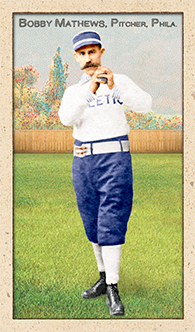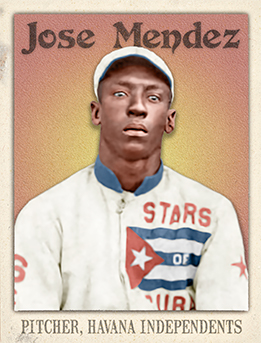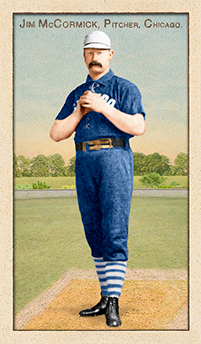
- Series: Beginnings: 1880's
- City: Chicago
- Team: White Stockings
- League: National League
James McCormick (1856-1918) was the first Scotsman to make his adopted country’s major leagues. A pitcher, Jim debuted with the Indianapolis Blues in 1878, their only season in the National League. He had a losing record but an eye-catching 1.69 ERA. He moved to Cleveland’s Blues in ‘79 and stayed until he made the jump to the Union Association in ‘84. Twice with Cleveland McCormick led the NL in wins and once in ERA. A brief term with Providence in 1885 led him to the White Stockings for the balance of ‘85 and the ‘86 season. In Chicago, Jim bonded with King Kelly. Together they helped the club to pennants both years. The battery produced 51 victories with McCormick going 20-4 in ‘85 and 31-11 in ‘86. Perhaps coincidentally (but fittingly), Jim gained a lasting place in baseball card history with his partner Mike Kelly as Goodwin & Co. honored each with ten different poses following the ‘86 championship season. Typical of the era, a contract feud led to McCormick’s sale to Pittsburgh in ‘87 when owner Al Spalding overruled Cap Anson who very much wanted to keep the sturdy hurler.
- McCormick compiled one of the great lifetime records on the mound: 264-214 with a 2.43 ERA (33rd all-time)
- McCormick's uniform color on this card was changed in April, 2017 from black to blue to reflect recent reliable research by Craig Brown & friends at Threads of Our Game. Two cards had been previously released featuring a black uniform.
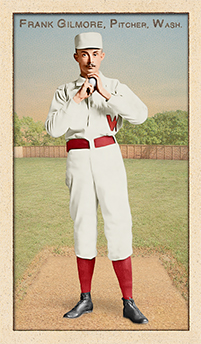
- Series: Beginnings: 1880's
- City: Washington, D.C.
- Team: Nationals
- League: National League
Franklin T. Gilmore (1864-1929) was nicknamed “Shadow” and cast a giant one with Washington when he formed the “Grasshopper Battery” (per John Thorn) or the “bones battery” as dubbed by early journalists, with catcher Connie Mack. The two made a striking pair: angular stringbeans of sinew and bone. Gilmore debuted in D.C. in 1886. There is dispute as to whether the Nationals wanted Gilmore or Mack more, but they came as a tandem and would be such during Frank’s all-too-brief sojourn in the majors. The battery-mates from Hartford’s Dark Blues’ ‘86 team were not only similar in build and stature, they were very close as roommates. Years later, Mr. McGillicuddy would reminisce about spending all night rubbing Gilmore’s arm with liniment in what proved a vain effort to prolong the young phenom’s career. Shadow reached a pinnacle on September 28 that rookie year when he fanned 16 St Louis Maroons, equaling the year’s best strikeout performance. Perhaps foreshadowing the young hurler’s future, the Nationals lost the contest 5-2, giving Gilmore poor support.
- The slender pitcher’s ML record proved slim as well: three seasons with Washington, 12 wins against 33 losses, a 4.26 ERA with 212 Ks in 405 innings
- On a side note, Bill James ranked Gilmore the worst professional baseball player of the 19th century
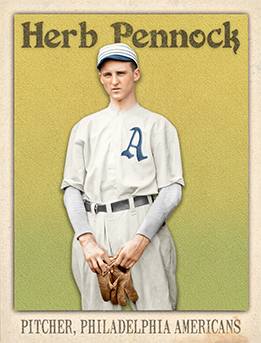
- Series: Diamond Heads '15
- City: Philadelphia
- Team: Athletics (AL)
- League: American League
- Hall: National Baseball Hall of Fame
Herbert Jefferis Pennock (1894-1948) was one of the premier left-handers in baseball history, winning 240 games and helping the Yankees to four pennants from 1923-32. Connie Mack rued the day he let Pennock go to Boston in 1915, giving up on a talent that would result in a plaque at Cooperstown. The Sox, too, gave up on Herb, sending him as the last of the out-migration (11 starters) from Boston to New York in 1923. An immediate hit in the new stadium in the Bronx, Pennock’s easy-going manner and slow curves kept his team relaxed. He rarely faced the aces of his era but was used in tough spots and key match-ups. Pennock excelled under the pressure of World Series in the Big Apple. In perhaps his finest moment, Herb clinched NY’s first title in ‘23 on one day’s rest; an effort renowned umpire Billy Evans called “the greatest pitching performance I have ever seen.” More October glory would follow including decisive saves in his finale against the Cubs in ‘32.
- Pennock went on to a front-office career, ending with the Phillies in ‘47. He closed his tenure in infamy as he fought Branch Rickey bitterly to keep Jackie Robinson out of Philadelphia
- Elected to Hall of Fame: 1948
- Series: Beginnings: 1880's
- City: Philadelphia
- Team: Athletics (AA)
- League: American Association
Robert T. Mathews (1851-1898) won the 1st Nat’l Assoc game on May 4, 1871. Over 20 years, Mathews became the only man to win 50+ games in each of the 3 early major leagues: NAPBB, the NL, and the AA. His resume includes an NL and an AA title with the Providence Grays and Phil. Athletics respectively. Stands 25th among winningest pitchers in MLB history.
- Won 297 games, more than any other pitcher NOT inducted into the Hall of Fame
- One of the first to use the spitball and execute the curve
- Series: Diamond Heads '15
- City: Havana
- Team: Stars of Cuba
- League: Independent
- Hall: Cuban Baseball Hall of Fame, National Baseball Hall of Fame
Jose de la Caridad Mendez (1887-1928) visited America from his native Cuba in 1908 and demolished the ML Cincinnati Reds and minor league all-stars from Florida. He was unbeaten, untied, and unscored upon. He allowed but a single to Miller Huggins in the 9th inning of his first game on US soil, and hurled a no-hitter in Key West. Ira Thomas, catcher for the 2-time world champion Athletics, compared Mendez favorably to Walter Johnson and said “he is a remarkable pitcher, and if he were a white man would command a good position on any Major League club in the circuits.”
- Became a star in the Negro Leagues, leading the KC Monarchs to pennants in ’23, ’24, and ‘25
- The Cuban “Black Diamond’s” career spanned 1908-26
- Elected to the Cuban Baseball Hall of Fame in its inaugural class: 1939
- Elected to the National Baseball Hall of Fame: 2006



